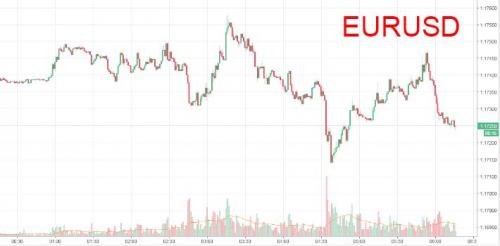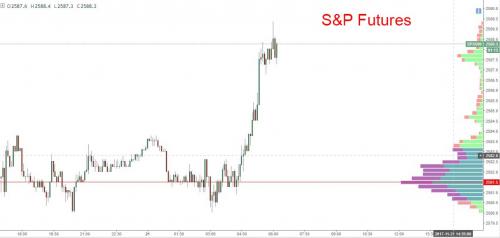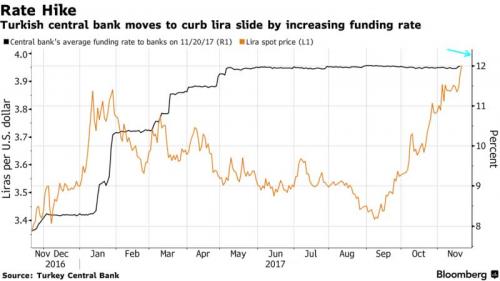S&P 500 futures are higher, continuing on yesterday’s momentum, after European and Asian shares also rose alongside a rebound in oil, as the year-end performance chase appears to be accelerating. There were several different moving parts in a mixed European session, in which early Euro strength gave way to weakness…

… which in turn pushed the Stoxx 600 and US index futures higher, rising above yesterday’s session high on negligible volumes.

Global equity futures rallied with Hang Seng futures outperforming and flash smashing to close the session, after a strong finish for Chinese equities following a report out of MNI that Chinese deleveraging may not be as stringent next year.
European stocks rose this morning (Stoxx 600 +0.3%) as the Euro sank, helped by positive notes out from Goldman Sachs, who are overweight European automakers. Goldman said in a Europe strategy note that “deep value sectors” (autos, oil, and utilities) will help Stoxx Europe to return 12% in next 12 months. As a result, European automakers outperform led by VW for a second straight day, with the SXAP index advancing as much as 1.9%, best of 19 groups on the Stoxx Europe 600 benchmark (Volkswagen +3.8%, Porsche +2.7%, BMW +2%, Daimler +1.7%). Additionally, Imperial Brand shares rallied after their CEO change, as analysts speculate that this could increase the likelihood that the company will be taken over by Japan Tobacco. Airliner EasyJet is flying high this morning following strong financial results. Bunds are taking another look at 163.00+ levels having faded rallies above the big figure on several occasions recently.
Stocks have already moved on from this weekend’s German government crisis: German President Frank-Walter Steinmeier said Germany was facing its worst governing crisis in the 68-year history of its post-World War Two democracy and pressed all parties in parliament “to serve our country” and try to form a government.
“The events have already been likened to Germany’s Brexit-moment,” said Daniel van Schoot, an economist at Rabobank. “That is perhaps exaggerated, but the German political situation is now very unpredictable, more than in the past three decades.”
Bonds across the region followed a rise in Treasuries after the European Central Bank was said to be likely to make only small adjustments to its guidance on monetary policy next year. EGBs rallied led by gilts which are supported ahead of index extension tomorrow, additionally some focus from European traders on dovish ECB sources piece from yesterday.
The dollar stayed within relatively tight ranges versus its major peers, with average volumes. The euro and the pound edged higher, backed by leveraged interest, only to be capped by their respective 55-DMAs before shedding gains. The Swedish krona led G-10 losses on the back of record low interbank rate fixings, while the Turkish lira pared a drop to an all-time low after the central bank raised borrowing costs. Meanwhile, sterling was steady and gilts advanced amid reports Prime Minister Theresa May has the backing of ministers to offer the European Union more money to break the Brexit deadlock. The Australian dollar dropped to a five-month low after suggestions from the central bank that interest rates will stay lower for longer; EUR/SEK breached 10.00 briefly before fading back. Turkey’s lira hit a new record low against the dollar but pared some of the drop after its central bank tightened liquidity, as the standoff between Erdogan and central bank continues.

In overnight central bank announcements, the Bank of England’s Deputy Governor Cunliffe said inflation has been a bit lower than BoE forecast in Autumn and that it’s possible to wait before tightening policy until there is clear evidence that pay growth is responding to unemployment level. Elsewhere, RBA minutes from November 7th meeting stated that any further appreciation in AUD would slow expected pick-up in inflation and the economy. The minutes also stated that there is considerable uncertainty on how fast wages might pick up and add to inflation, while it added that a pass-through to inflation may be delayed by many factors. RBA’s Lowe stated that there is ‘not a strong case’ for near-term change in interest rates with the bank paying attention to soft wage growth.
In the U.S., confirmation that Federal Reserve Chair Janet Yellen will leave the board in February creates a fourth vacancy for President Trump to fill, making it trickier for investors to bet on the central bank’s interest rate trajectory next year. While the Thanksgiving holiday gives traders an excuse to pause, equities are heading into the end of the year near their peaks, with investors optimistic about global growth and company earnings.
Meanwhile, the collapse in the US Treasury curve continued, with 2s10s moving below 60bps, and screaming inversion as soon as early next year. At the same time, The gap between French and German borrowing costs on Tuesday narrowed to its tightest level since before the euro zone debt crisis of 2010-2012. Germany’s 10-year yield fell two basis points to 0.34%, the lowest in almost two weeks. Britain’s 10-year yield decreased four basis points to 1.257%, the lowest in almost two weeks. Japan’s 10-year yield dipped one basis point to 0.033%, the lowest in more than a week.
Oil prices rose on expectations of an extended OPEC-led production cut, although rising output in the United States capped gains. Brent crude futures were up 0.78 percent to $62.72. West Texas Intermediate crude fell 0.6 percent to $56.09 a barrel. Gold increased 0.3 percent to $1,280.39 an ounce. Copper gained 0.3 percent to $3.13 a pound, the highest in more than a week.
Expected economic data include Chicago Fed National Activity Index and existing home sales. Companies including Medtronic, Lowe’s, Salesforce, Analog Devices, HP Enterprise and HP Inc. are reporting earnings.
Bulletin Headline Summary from RanSquawk









Leave A Comment